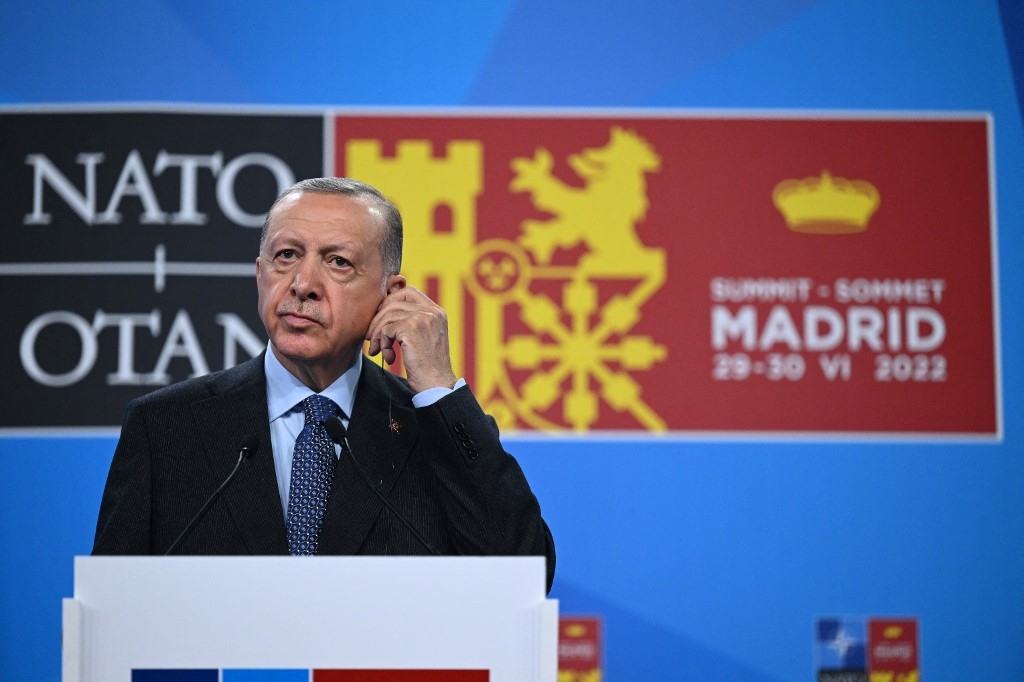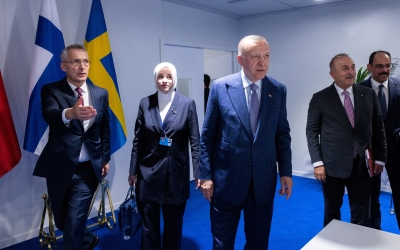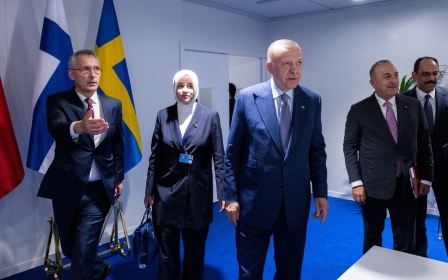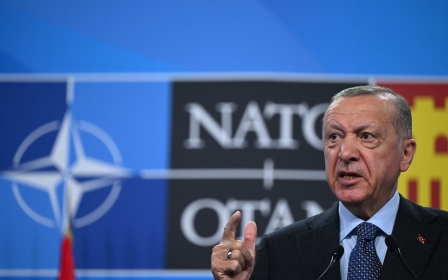Turkey: Erdogan renews threat to block Sweden and Finland from Nato membership

Turkish President Recep Tayyip Erdogan on Monday renewed his threat to "freeze" the Nato membership bids of both Sweden and Finland unless the military alliance complies with Ankara's conditions.
After weeks of wrangling, Turkey announced last month the signing of a memorandum with Finland and Sweden that opens the way for the two countries to become Nato members.
'I want to reiterate once again that we will freeze the process if these countries do not take the necessary steps to fulfil our conditions'
- President Erdogan
The two nations have dropped their history of military non-alignment and announced plans to join Nato in response to Russia's invasion of Ukraine.
But new countries' applications must be approved by all members and ratified by their respective parliaments.
Their bids were headed for swift approval until Erdogan voiced concerns in May over the countries’ support for Kurdish militant groups which Ankara considers terrorist groups. In addition, the Turkish leader demanded the Nordic countries lift arms embargoes imposed in response to Turkey's 2019 military incursion into Syria.
New MEE newsletter: Jerusalem Dispatch
Sign up to get the latest insights and analysis on Israel-Palestine, alongside Turkey Unpacked and other MEE newsletters
"I want to reiterate once again that we will freeze the process if these countries do not take the necessary steps to fulfil our conditions," Erdogan said Monday, on the eve of his trilateral summit with Russia and Iran.
"We particularly note that Sweden does not have a good image on this issue," he added.
A 10-point memorandum signed by the three sides on the sidelines of the Nato summit at the end of June appeared to address many of Erdogan's concerns. Turkish officials say they will seek the extradition of 33 "terror" suspects from Sweden and Finland as part of the agreement, although the deal did not include specific references to extradition.
Turkish dissidents in Sweden have expressed their fears that the deal might lead to their extradition.
The 33 individuals named by Turkey are all accused of being either outlawed Kurdish militants or members of a group led by the US-based preacher Fethullah Gulen, who Turkey blames for a failed 2016 coup.
Yet Erdogan told reporters after the summit that the new memorandum did not mean Turkey would automatically approve the two countries' membership.
"If they fulfil their duties, we will send it to the parliament. If they are not fulfilled, it is out of the question," he said at the time.
The trilateral memorandum, according to Finnish President Sauli Niinisto, will see the countries "enhance cooperation on counter-terrorism, arms exports and extraditions".
Tense negotiations
The three-hour negotiations between Erdogan and his Finnish counterpart Sauli Niinisto and Prime Minister Magdalena Andersson of Sweden in Madrid were tense, according to a source with knowledge of the meeting.
Erdogan made clear that his participation in the negotiations was only possible thanks to Nato secretary general Jens Stoltenberg’s invitation, the source told Middle East Eye.
Turkish officials involved in the technical talks before the meeting were happy with the progress they had made. One senior Turkish official appreciated Sweden’s efforts to amend their laws to combat terrorism more forcefully, even though they predated Turkey’s demands. Yet Erdogan was not satisfied, with images of PKK flags flown freely in demonstrations on Stockholm's streets and interviews with YPG leaders on Swedish state TV. Both Kurdish factions are considered terrorist groups by Turkey.
Before the memorandum, there had even been a debate in Ankara over giving Finland the green light while maintaining that further negotiations with Sweden were needed.
In Madrid, negotiators saw little sign of a conciliatory approach, as Erdogan used his opening remarks to repeat his red lines: the PKK being allowed free rein in Swedish and Finnish cities; suspects linked to the group not being extradited; and aid given to the YPG. Both countries were still blocking arms exports to Turkey, he noted.
The United States and some Nato states have worked closely with the YPG to combat the Islamic State group since 2014, a move that substantially undermined Ankara’s trust in its western allies.
Erdogan responded by saying that Finland and Sweden’s Nato membership was not a birthright but a privilege, so they don’t set the rules.
“I want you to abide by our red lines,” Erdogan repeated, bringing the negotiations to a stalemate.
Sources said one fundamental disagreement was whether the YPG and the movement of Fethullah Gulen should be designated as terrorist groups.
Sweden and Finland refused to recognise them as such and then the parties took a break to contemplate.
The solution was put forward by Turkish intelligence chief Hakan Fidan, who said Erdogan wouldn’t sign a deal unless Sweden and Finland made clear commitments on the YPG and the Gulenists.
“Instead of designating them as terror groups, both countries clearly said in the text of the memorandum that they would not provide support to these specific groups, which broke the deadlock,” said a source.
Middle East Eye delivers independent and unrivalled coverage and analysis of the Middle East, North Africa and beyond. To learn more about republishing this content and the associated fees, please fill out this form. More about MEE can be found here.





